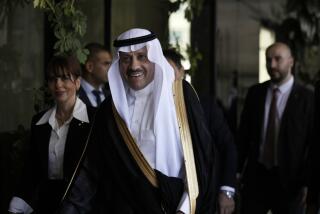Syria Severs Moroccan Ties Over Perez Visit : Israeli and Monarch Hold Historic Summit
- Share via
RABAT, Morocco — King Hassan II of Morocco, breaking ranks with most other Arab states, met with Israeli Prime Minister Shimon Peres on Tuesday at a historic summit conference to discuss the prospects of peace in the Middle East.
Their controversial meeting, held amid strict secrecy and security at the king’s summer palace in Ifrane, 125 miles east of Rabat, the capital, was widely viewed by Western diplomats and Arab officials as an attempt by Hassan to support the peace initiative that Jordan’s King Hussein is trying to pursue with Israel after his break with the Palestine Liberation Organization.
Refreshing the Precedent
By refreshing the precedent set by Egypt in 1977, when the late President Anwar Sadat went to Jerusalem, Hassan may be trying to make it easier for Hussein to take a similar step in the near future, some diplomats and other observers said.
“The king, for some time, has also thought of himself as a man who should play a role in the Middle East peace process,” in part because of Morocco’s status as an Arab country with a large Jewish population and his present role as chairman of the Arab League, one diplomat said. “He apparently thought now was the time to do it.”
However, there was widespread skepticism among Western diplomats and other officials that Hassan’s dramatic entrance onto the center stage of Middle East diplomacy could accomplish anything substantial because of Morocco’s peripheral position in the Arab-Israeli conflict. They noted also that Hassan was taking “an enormous risk” by courting censure and very likely expulsion from the Arab League by becoming only the second Arab leader to openly negotiate with Israel.
“As with Egypt a few years ago, there will be a lot of pressure on the other Arabs to expel Morocco from the Arab League,” said a senior Western diplomat in Tunis, Tunisia, the headquarters of the Arab League. “I think that will be a likely outcome.”
Arab reaction to the Hassan-Peres summit was mixed but predictable. Syria immediately severed diplomatic relations with Morocco, while Iraq, Algeria and Libya--the last of which signed a unity agreement with Morocco two years ago--all condemned Hassan.
‘Blow to Arab Unity’
In Tunis, which is also the headquarters of the political wing of the PLO, a PLO spokesman described Hassan’s initiative as a severe “blow to Arab unity and solidarity” and said PLO Chairman Yasser Arafat has called an “urgent meeting” of the PLO leadership to formulate a Palestinian response.
Egypt supported Hassan’s initiative. But Jordan remained silent--as did Saudi Arabia, whose influence would be pivotal in any Arab League attempt to censure Morocco.
Peres arrived in Morocco on Monday night for a 48-hour visit that seemed to take most Arab governments by surprise.
It was understood, however, that the United States and possibly some other “friendly” countries had been informed of the plans for the visit well in advance.
Planning Begun Early
In Israel, government sources said Peres received Hassan’s invitation to come to Morocco more than a week ago, and other sources said the planning, for logistical and security purposes, began long before that.
The agenda for the talks was not disclosed, although Moroccan officials said the two leaders were discussing in general terms the prospects for Middle East peace following the collapse last February of a yearlong joint peace initiative by Jordan and the PLO.
Since then, relations between Jordan and the PLO have rapidly deteriorated, with Hussein attempting--thus far unsuccessfully--to persuade Palestinians living in the Israeli-occupied West Bank of the Jordan River to renounce the PLO and accept Jordan as their representative in peace talks with Israel.
Shortly after Hussein suspended the so-called Amman accord on Feb. 19, accusing Arafat of reneging on promises to recognize Israel, thousands of Palestinians turned the funeral of an assassinated West Bank mayor into a massive anti-Hussein demonstration, burning the monarch’s picture and chanting pro-Arafat slogans. Undeterred, the king closed the Jordan offices of Arafat’s Fatah wing of the PLO earlier this month and ordered Fatah’s military commander, Khalil Wazir, to leave the country.
Dovetailing Neatly
Although Moroccan officials insisted that the Hassan-Peres meeting was “purely an Israeli-Moroccan affair” unrelated to broader peace efforts, a number of diplomats noted that Moroccan and Jordanian efforts appeared to dovetail too neatly to be uncoordinated.
“I am sure Hussein was involved in this,” said a Western diplomat in Tunis. “It seems to be a way of trying to get Hussein out of the stigma of (pursuing) a separate peace.”
This conviction was deepened by word of the arrival in Amman on Monday of Mohammed Awad, Hassan’s special adviser, and by a flurry of phone calls that Hussein subsequently made to President Hosni Mubarak of Egypt, King Fahd of Saudi Arabia and President Hafez Assad of Syria.
Other diplomats, however, noted that more personal and parochial motivations may also have been behind the meeting, held in Hassan’s summer palace on a pine-fringed hilltop in central Morocco.
Onto Center Stage
“A lot of it has to do with the domestic political considerations of Hassan and Peres,” a senior diplomatic source said. “Hassan, for his part, seems to want to enhance Morocco’s importance in the Arab world by thrusting himself into center stage. He also wants to improve his relations with the United States, soured when Morocco signed the unity agreement with Libya two years ago.”
Peres, the source noted, is scheduled to swap jobs with Foreign Minister Yitzhak Shamir, leader of Israel’s hard-line Likud Bloc, in October. However, a dramatic, even if not significant, development in the Middle East peace process could enhance Peres’ popularity at home and allow him to return to the premiership through new elections.
These political calculations on both sides complement one another because there is a widespread and pervasive belief among moderate Arab leaders, including Hassan, that what little hope is left for the foundering Middle East peace process will be dispelled once the hard-line Shamir takes office.
More to Read
Sign up for Essential California
The most important California stories and recommendations in your inbox every morning.
You may occasionally receive promotional content from the Los Angeles Times.













